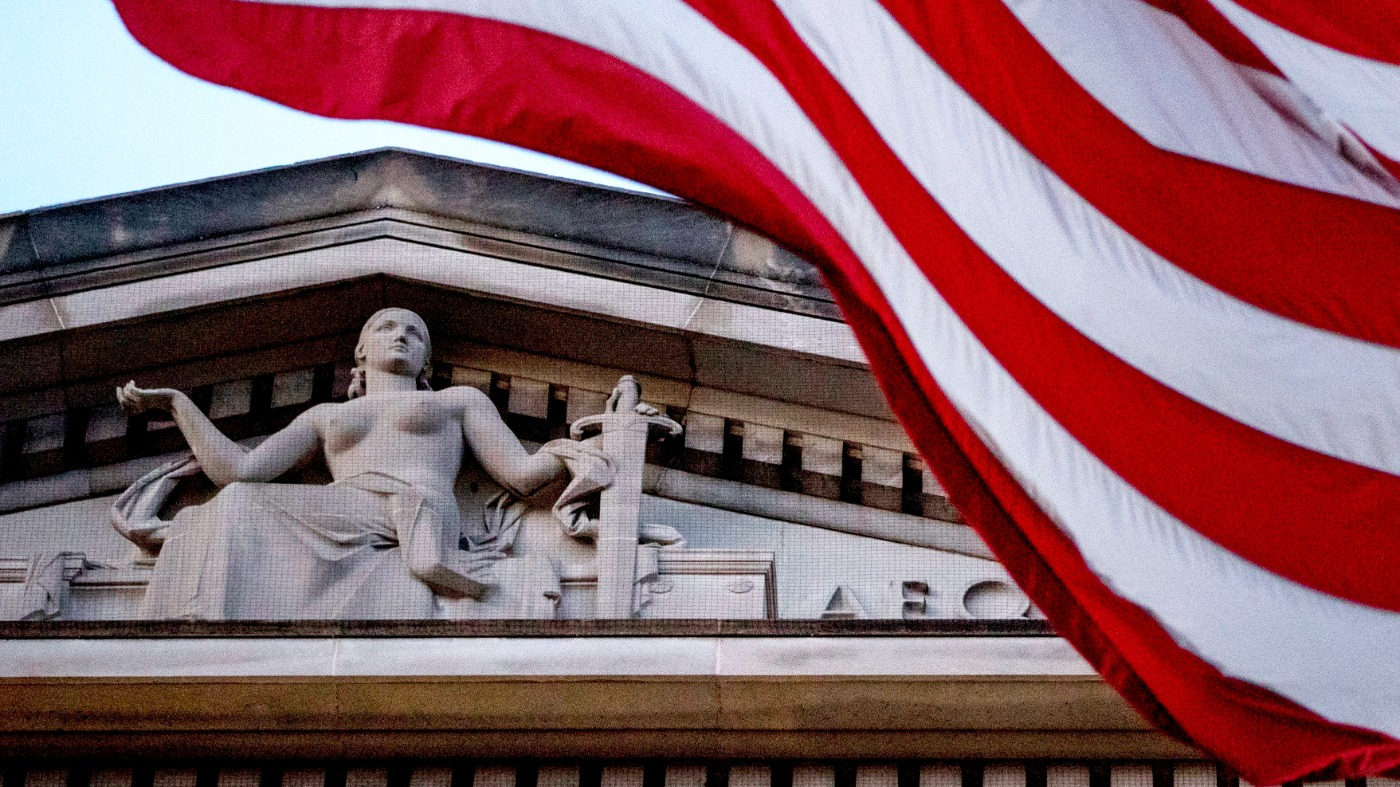
An American flag flies outside the Department of Justice in Washington, March 22, 2019. (AP Photo/Andrew Harnik, File)
Featuring two impeachment proceedings, the shredding of a State of the Union speech, and the ransacking of the Capitol, the period from 2016 to 2020 will not be remembered for bipartisanship.
Yet the First Step Act, passed overwhelmingly by Congress in December 2018, reflected consensus amid the nation’s fractured politics that the federal prison system must do more than simply warehouse those who break the law.
A handful of narrower changes had preceded its passage, including the reduction of the penalty disparity between crack and powder cocaine ushered in by the Fair Sentencing Act of 2010. Still, the federal system had largely been on autopilot driven by harsher penalties and longer sentences, with too little thought and resources devoted to rehabilitation and reintegration — the keys to boosting public safety.
Despite its modest moniker, the First Step Act was a much bigger step, as it reined in the most excessive penalties for low-level drug offenses and allowed some people in federal prison to earn time off their sentences by completing programs. Notably, the act also provided funding to expand access to such treatment as well as educational programs designed to reduce recidivism.
Unfortunately, some GOP presidential candidates, in their attempts to pass the Trump train on the right, are now claiming that the act caused a crime surge while sidestepping their burden of proof. These attacks are ironic, given Republicans’ past support for the law, and the fact that many left-wing groups opposed it primarily because they felt it didn’t go far enough.
The fact is, the First Step Act was a truly bipartisan milestone, receiving 87 votes in the Senate and 358 votes in the House. Those backing it included current House Judiciary Chairman Jim Jordan (R-Ohio) and Florida Gov. Ron DeSantis (R) (then a Congressman), who is now among its leading critics.
To be sure, all Americans are right to be concerned with the spike in violence that began during the middle of 2020, even though homicides and other violent crimes are now falling, as the Council on Criminal Justice recently reported. Much more work remains to bring the violent crime rate back to its 2019 level, which was 49.7 percent below its peak in 1991.
It is hardly unreasonable to ask whether the First Step Act, which was approved in December 2018, is somehow to blame for the subsequent uptick in crime, but the best evidence currently available suggests otherwise.
First, while further research is needed to measure the full impact of the act, we know that federal laws generally do not affect the vast majority of criminal cases, given that more than 90 percent are processed in state courts. Moreover, the act covers just a portion of the federal caseload.
A key provision allows people in federal prison who are judged low-risk by a validated risk assessment tool — and who did not commit any of the most serious crimes — to earn credits toward release by completing behavior-change programs. To date, the number of people who have been released earlier than otherwise by earning such credits accounts for less than 1 percent of the 1.8 million people incarcerated in the U.S.
Though the act cannot substantially affect overall crime rates, given the limited federal footprint in this field, it laid down an important philosophical marker in applying the principles of fiscal and personal responsibility to the system. These are two longstanding bulwarks of conservative thought.
With many U.S. Bureau of Prisons facilities in disrepair and a billion-dollar proposal for new prisons on the table, it’s only sensible to ensure that prison space is used wisely. Promoting personal responsibility means that there should be some connection between people’s conduct and how they are treated. Hence, First Step provides an incentive for self-improvement in prison, just as those of us in the free world are rewarded for our work.
The act is anything but a social experiment concocted by liberals in Washington, given that it was inspired by more than a decade of successful reforms in both red and blue states. The 2016 Charles Colson Task Force on Federal Corrections report that provided a blueprint for reform noted that some 38 states provide earned credits like those provided for in the act, and concluded that such credits boost program participation rates, improving behavior behind bars as well as prospects for success upon release.
Conservative lawmakers who championed the First Step Act, such as Sen. John Cornyn (R-Texas) and Sen. Tom Tillis (R-N.C.) have drawn parallels between the act and successful changes in their own states.
Family ties are valued by conservatives and Americans more broadly, and the act has moved the needle on the goal of keeping families connected.
More than 7,300 people in prison have obtained transfers to be housed closer to their loved ones, thanks to the act’s requirement that incarceration occur within a 500-mile radius of home. There are sensible exceptions to this, such as when the right program for that person is only available at a more distant unit, but expanding programming and addressing staffing shortfalls can help address some of the 32 percent of remaining cases in which people are incarcerated more than 500 miles from home.
When it comes to the impact of the First Step Act on recidivism, political candidates and the public should act like a judge or jury. That means waiting for all the facts to come in before reaching a verdict.
The limited data published to date by the Bureau of Prisons shows that just 12.4 percent of those released earlier than otherwise because of credits earned under the act have been reincarcerated at the federal, state or local level. But the bureau acknowledges that this figure encompasses those released at various times since the act went into effect in 2019, so more data involving a standardized follow-up period for individuals with similar risk profiles is needed to evaluate the act’s impact on recidivism.
While we await such data, it’s worth recognizing that substituting political opportunism for objective analysis is too often a repeat offense. Fortunately, new survey research by The Adams Project, a conservative group that advances criminal justice reform, indicates that the vast majority of Republican primary voters reject these attacks on the First Step Act, and prefer balanced criminal justice approaches that emphasize both accountability and rehabilitation to simplistic messaging focused only on maximizing punishment.
Legitimate policy disagreements on crime should be part of political campaigns. But prison reforms at the state and federal level have been embraced across the spectrum because all Americans have an interest in a system that treats people fairly and breaks the cycle of crime without breaking the bank.
We must continue to evaluate the impact of the First Step Act and similar state initiatives while remembering that empty political rhetoric doesn’t do justice to the high stakes of getting corrections policy right.
Marc Levin is chief policy counsel for the Council on Criminal Justice and was part of numerous White House meetings related to the First Step Act in his former role leading the Right on Crime initiative. He can be reached at mlevin@counciloncj.org.
Criminal justice reform in the United States
Fair Sentencing Act
Jim Jordan
John Cornyn
Politics of the United States
Prison reform
Prison reform; FIRST STEP Act
Ron DeSantis
Thom Tillis
Copyright 2023 Nexstar Media Inc. All rights reserved. This material may not be published, broadcast, rewritten, or redistributed.
This post was originally published on this site be sure to check out more of their content.







